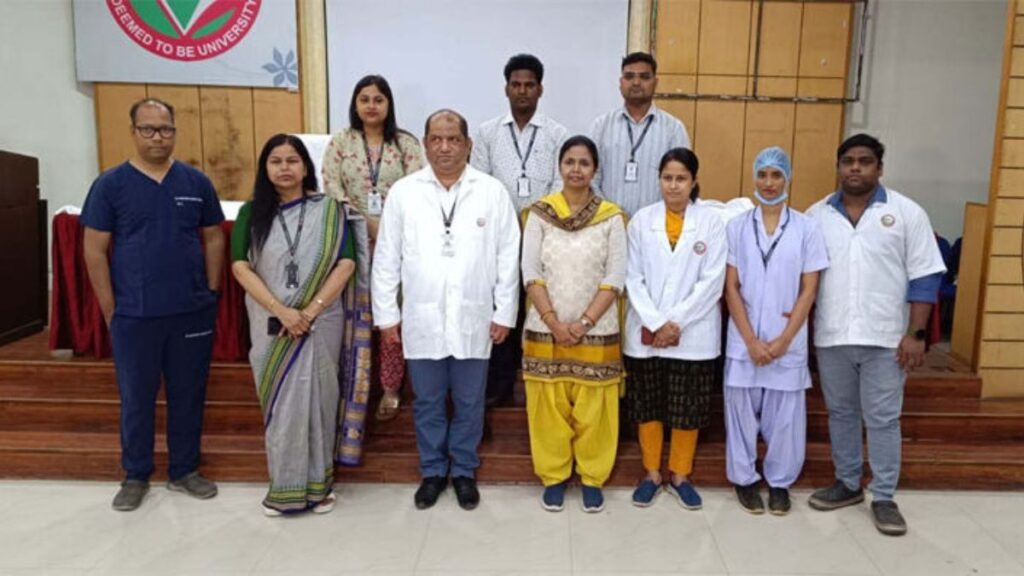Bhubaneswar: The Department of Clinical Hematology at the Institute of Medical Sciences and SUM Hospital in Odisha achieved a significant milestone by successfully performing a Haploidentical Hematopoietic Stem Cell Transplantation (HSCT) on a female patient diagnosed with Acute Myeloid Leukemia (AML). Dr. Priyanka Samal, Professor and Head of the department, explained that this type of transplant involves extracting healthy, blood-forming cells from a donor who is a half-match to the recipient, replacing the unhealthy cells in the patient.
In this case, the donor was the patient’s daughter, whose Human Leukocyte Antigens (HLA) matched half of her mother’s. Although the patient experienced some post-transplant complications, they were promptly and effectively managed. Dr. Samal emphasized that this was the first successful Haploidentical transplant in the state, performed at a reasonable cost.
Dr. Samal had received training in this specific procedure at the Princess Margaret Cancer Center in Toronto several months prior, aiming to reduce mortality rates and improve outcomes. She regarded this case as a valuable learning experience for the entire department team.
While acknowledging the risks, particularly the potential for Graft-versus-host disease (GvHD), Dr. Samal expressed gratitude that the patient had safely surpassed the critical 45-day mark post-transplantation. Typically, transplantation-related mortality in such cases is around 30%, with a relapse rate of approximately 40%.
The team remains hopeful for the patient’s complete recovery, emphasizing their ongoing commitment to her well-being and the transformative potential of advanced medical interventions like this transplantation.
Dr. Samal said: “We have been conducting fully matched sibling donor stem cell transplants but it’s difficult to find a healthy Matched Sibling Donor (MSD) for every patient eligible for HSCT. There is only 1 in 4 or 25 per cent chance of a patient matching with his or her sibling.”
“But Haploidentical HSCT provides almost 100 per cent possibility of getting a 50 per cent matched healthy donor for a patient,” she said.
The chances of graft rejection, GvHD, transplant and non-transplant related mortality are relatively higher in Haploidentical HSCT as compared to MSD HSCT, Dr. Samal said.
“But with recent advancements and understanding, Haplo transplants are providing a hope for cure to patients without a MSD with manageable complications and better outcome,” she said.
Prof. (Dr.) Pusparaj Samantasinhar, Medical Superintendent of the hospital and Prof. (Dr.) Girija Nandini Kanungo, Head of Department of Transfusion Medicine and Dr. Santosh Kumar Singh, In-charge of Hemato ICU were present at the news conference.
Prof. (Dr.) Samantasinhar said Stem Cell Transplant required a multi-disciplinary approach involving a big team including the departments of Clinical Hematology, Transfusion Medicine and Lab Hematology. “This treatment was available in hospitals in big cities five to ten years ago involving huge cost and mental stress. The same treatment is now available in IMS and SUM Hospital at lower price,” he said.
He said that the hospital had already conducted around 50 Stem Cell Transplantations so far of which 70 per cent cases had been done under the Biju Swasthya Kalyan Yojana (BSKY).
Prof. (Dr.) Samal said the hospital had been conducting Autologous and Allogenic Stem Cell Transplantation earlier but it was the first time that it had undertaken a Haploidentical Hematopoeitic Stem Cell Transplantation successfully.
She said the need was for heightened awareness about stem cell donation which was just like blood donation. Such donation will go a long way in the treatment of critical patients suffering from AML and other blood related ailments. Stem cells of the donors get replenished within a week’s time, she said.

